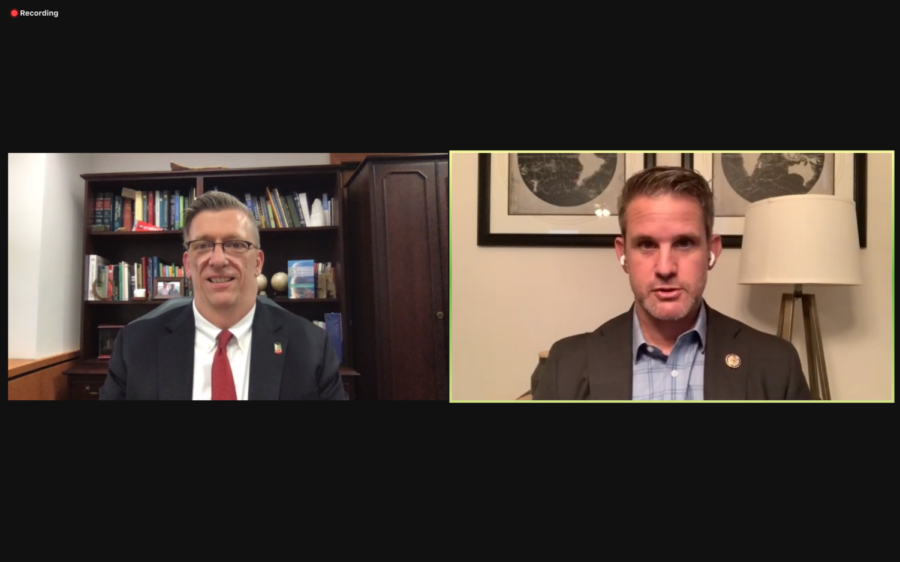Kinzinger discusses state of US democracy in NIU lecture series
Robert Brinkmann Dean, College of Liberal Arts and Sciences (left) moderates the discussion with U.S. Rep. Adam Kinzinger (right).
April 2, 2021
DeKALB – U.S. Rep. Adam Kinzinger spoke on the current state of the American democratic system and several of his policy positions while speaking at NIU’s “Rebuilding Democracy” lecture series Tuesday.
Kinzinger, a Kankakee native, has been serving as a Republican in the U.S. House of Representatives for over a decade, first in Illinois’ 11th district, and then the 16th district. He spoke at the digital event via Zoom. Kinzinger was one of only ten Republicans to vote in support of former President Donald Trump’s impeachment in 2021, despite towing the president’s policy line 90% of the time, according to FiveThirtyEight.com.
Kinzinger recalled being present in the House during the storming of the Capitol building on Jan. 6, the event that drove him to vote to impeach.
“Frankly, I was pretty ticked off, so I went down after seeing a few members give the same speeches they had prepared before the whole insurrection, and I gave a one or two minute speech basically calling that out,” Kinzinger said. “In hindsight, looking back and taking it into account, it really was a good moment because we said we’re not going to be deterred.”
Kinzinger said he has hopes that politicians and Americans will move away from accusations of election fraud in the 2020 presidential election, a belief that three quarters of Republicans and nearly a third of Democrats hold nationally, according to a poll by Rasmussen Reports.
Kinzinger also addressed his own family’s condemnation of him, following his vote to impeach Trump, when almost a dozen family members called him an embarrassment to the Kinzinger family name in an open letter to the Congressman.
“(We need to) try to see each other as Americans and not as enemies,” Kinzinger said. “How do we make those steps? The best advice I can give is you just have to be responsible for your own actions. You’re not going to be able to argue somebody into capitulation. It’s being responsible for your own behavior and starting to see things through other people’s eyes.”
Kinzinger also stated his hope that the younger generations will bring political discourse back to a more civil state of being, despite the lack of an example being set by politicians today, before the discussion turned to more policy-oriented issues.
While discussing the new executive agenda, the congressman expressed doubts that President Joe Biden’s recently unveiled infrastructure spending package would be something he supports immediately, citing certain issues specifically such as the proposed estate tax, which he said would be disastrous for small family-owned farms.
“One of the worst things we can do is to say, if somebody dies and they want to pass this farm on to their kids, they will be taxed on that,” Kinzinger said. “(They then) have to go find the money to pay the tax. That’s when these farms start selling out to bigger businesses or to other farms.”
Despite misgivings, Kinzinger did state his expectation of finding a middle ground.
“I’ve always been a huge advocate for infrastructure, but I do think it’s important for folks to understand that negotiation is normal,” Kinzinger said. “We can easily get to there if we just have the will to do it.”
Despite the allocation of $48.1 billion in federal funds to improve infrastructure in the 2009 Obama-era American Recovery and Reinvestment Act, as of this year, the nation’s infrastructure still receives a grade of C-, according to the American Society of Civil Engineers.
On the issue of sourcing the nation’s energy needs, Kinzinger said he believed creating a diverse set of energy sources was important on a diplomatic as well as a financial level, as it makes the nation less dependent on foreign states for energy needs.
“Look at what the Russians are trying to do by building a pipeline to Germany, to bypass Eastern Europe and strengthen Russia’s energy hold on Europe,” Kinzinger said. “None of us want to go to war with Russia, but how can we push back through the economic side? Well, exporting of natural gas is one way to give Europe access to American natural gas, which we have plenty of.”
Kinzinger also stated his belief in the future of nuclear energy, although Exelon recently announced the planned closure of the 30-year-old Byron nuclear power station, which lies within Kinzinger’s own district.
Shifting to foreign affairs, Kinzinger said he believes the American people want to be free of the endless conflicts in Afghanistan and the middle-east, but said he couldn’t foresee a complete troop withdrawal any time soon.
“We will get to a point where it winds down, but I think we need to do it under a condition where we don’t have to go back because if it just gets worse, you’re going to go back and start the thing all over again,” Kinzinger said.
This year will mark two decades since the U.S. established a military presence in Afghanistan.
Editors note: This story was updated at 12:30 p.m. Friday to state that former President Donald Trump’s impeachment occurred in 2021, not 2020.







